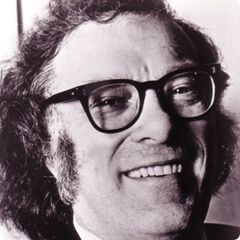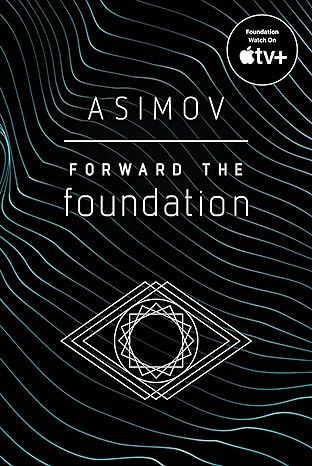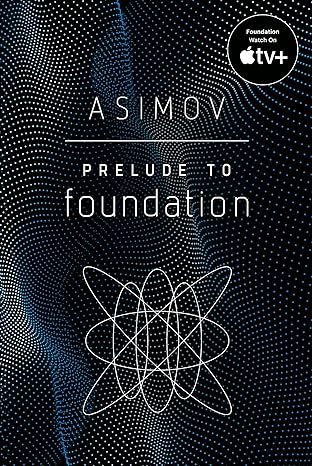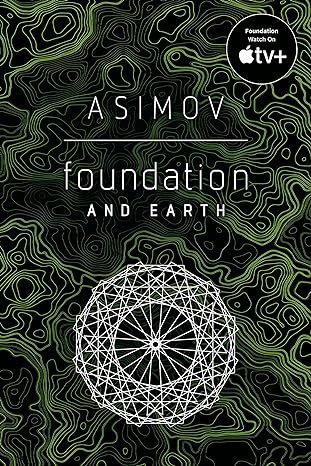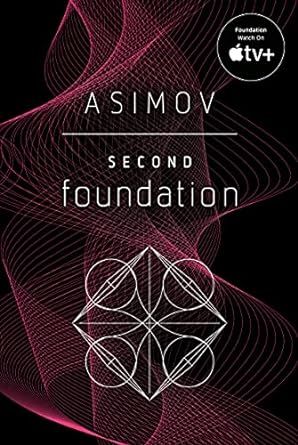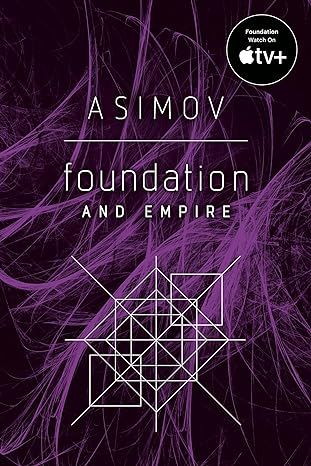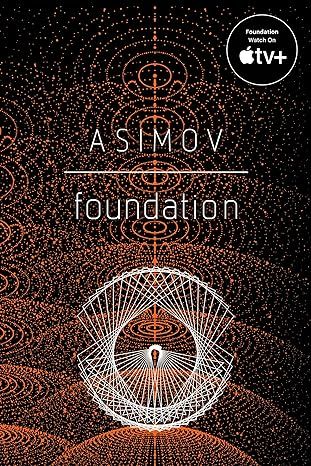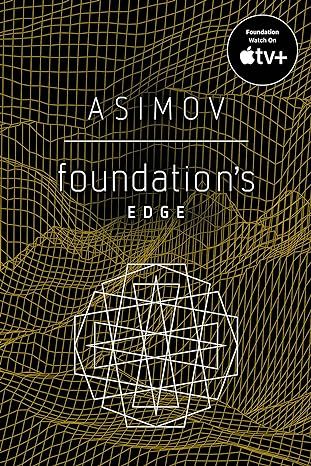
Foundation's Edge
4.7 out of 5
7,652 global ratings
The fourth novel in Isaac Asimov’s classic science-fiction masterpiece, the Foundation series
THE EPIC SAGA THAT INSPIRED THE APPLE TV+ SERIES FOUNDATION
At last, the costly and bitter war between the two Foundations has come to an end. The scientists of the First Foundation have proved victorious, and now they return to Hari Seldon’s long established plan to build a new Empire on the ruins of the old. But rumors persist that the Second Foundation is not destroyed after all—and that its still-defiant survivors are preparing their revenge. Now two exiled citizens of the Foundation—a renegade Councilman and a doddering historian—set out in search of the mythical planet Earth . . . and proof that the Second Foundation still exists.
Meanwhile someone—or something—outside of both Foundations seems to be orchestrating events to suit its own ominous purpose. Soon representatives of both the First and Second Foundations will find themselves racing toward a mysterious world called Gaia and a final, shocking destiny at the very end of the universe.
About the authors
Isaac Asimov
Isaac Asimov was an American author and professor of biochemistry at Boston University, best known for his works of science fiction and for his popular science books. Asimov was prolific and wrote or edited more than 500 books and an estimated 90,000 letters and postcards. His books have been published in 9 of the 10 major categories of the Dewey Decimal Classification.
Asimov wrote hard science fiction and, along with Robert A. Heinlein and Arthur C. Clarke, he was considered one of the "Big Three" science fiction writers during his lifetime. Asimov's most famous work is the Foundation Series; his other major series are the Galactic Empire series and the Robot series. The Galactic Empire novels are explicitly set in earlier history of the same fictional universe as the Foundation series. Later, beginning with Foundation's Edge, he linked this distant future to the Robot and Spacer stories, creating a unified "future history" for his stories much like those pioneered by Robert A. Heinlein and previously produced by Cordwainer Smith and Poul Anderson. He wrote hundreds of short stories, including the social science fiction "Nightfall", which in 1964 was voted by the Science Fiction Writers of America the best short science fiction story of all time. Asimov wrote the Lucky Starr series of juvenile science-fiction novels using the pen name Paul French.
Read more
Reviews
Al Azose
5
A soul-satisfying tale of galactic powers deciding on the fate of the Galaxy
Reviewed in the United States on July 9, 2013
Verified Purchase
Warning: Spoiler Alert!
It is 500 years after the establishment of the Foundation on the isolated planet of Terminus. The young and brash councilman, Golan Trevize, has been drawing the irritated attention of the Mayor of Terminus for his overt actions regarding his negative opinions of Hari Seldon’s “Plan”, and the existence of the Second Foundation. And this gets him exiled, along with a 52 year-old scholar of history and mythology, Janov Pelorat.
Yet, it is a very strange exile. He is given a powerful computer-controlled spaceship with the ability to jump through hyperspace with ease, and a “mission” to search for “Earth”, the legendary planet of human origin. Meanwhile, Stor Gendibal, a brilliant and powerful speaker of the Second Foundation, still located on the planet Trantor, prior center of the Galactic Empire, proves to the First Speaker, that a group with mentalic powers greater than their own, are keeping the Seldon Plan on track with far greater accuracy than the Second Foundation could. He further points out that it is Golan Trevize, the councilman of the Foundation Federation, who is the inadvertent pawn of this “anti-mule” group.
And so begins the incredible odyssey of Golan and Janov, as they bond together on their quest through the Galaxy to find Earth, but unknowingly to unravel a mystery which holds the fate of the entire Galaxy in their hands.
There are a multitude of science fiction stories which describe starships speeding across the Galaxy, flitting from star to star or planet to planet, but most of them pay little attention to the details of what that interstellar travel must involve. Asimov, via the delightful and thoughtful conversations of his two protaganists of Golan and Janov, provide the readers with a truly appealing interchange between the two men as they become fast friends in the depths of space. And in that interchange, we are treated to the beautifully explained and articulated thoughts and trade secrets of space travel and mythology – and the “rules” of how to behave on a strange planet - of a time 20,000 years in the future.
Asimov leaves us well entertained with his soul-satisfying climax, as the three “powers” in the Galaxy – the Foundation, the Second Foundation, and the “anti-mules” of the mysterious planet “Gaia” - meet in stalemate in space to let Golan Trevize decide the future fate of the Galaxy.
Read more
4 people found this helpful
William S. Morris
5
Looking for earth
Reviewed in the United States on November 16, 2023
Verified Purchase
This book is obviously written a significant time after the foundation series had become a thing. The science was no longer out of date. The language as also update except for the history professor who sounded like a contemporary of HG Wells. The story moves along in a way that keeps one constantly interested in what's next. The basic idea is that the mayor of terminus gets a thorn out of her side by sending him off on a quest to find the second foundation. She teams him up with a history professor on a quest to find the list origin planet of earth. They're put on a cutting edge advanced space ship with the idea that they'll never return. Well they never find earth or the second foundation, but they find Gaia (Greek for Terra). Seems Gaia has some unique aspects that it has successfully kept hidden until this terminus politician comes snooping around. This gets the mayor, the second foundation, and a few other people all in a dither. The end result is predictable, but still an amusing read.
Read more
Ellen M. Linzey
5
great story
Reviewed in the United States on February 21, 2024
Verified Purchase
Much better than the series, much deeper and thought provoking. I like the series but it is a much lesser thing
anniehill3333
5
A worthy successor to the greatest sci-fi trilogy of all time
Reviewed in the United States on August 19, 2023
Verified Purchase
Somehow, Asimov manages to immerse the Foundation universe we thought we knew into deep new shadows of mystery and uncertainty. We explore these shadows in the company of compelling and sympathetic characters, and through the unfolding of a tightly constructed and unremittingly suspenseful plot. I am immediately starting on <<Foundation and Earth>> and looking forward to the two prequels.
Read more
Regis
4
Brilliantly develops further and expands the original Trilogy
Reviewed in the United States on November 3, 2020
Verified Purchase
This is certainly the most elaborate, intricate and complex plot among the Foundation books I have read so far. It is not only much denser as three plots move together (the First and Second Foundation and Gaia) and merge perfectly at the end, it also is much more ambitious in its philosophical discussions about free will—a subject that is central to anything related with the Seldon Plan, but that was never touched so openly as in this book. The plot is so much more complex that starts as a kind of origin story (much like Prometheus for the Aliens franchise, ‘to be continued…’ in the next book whose title is conveniently 'Foundation and Earth'), while also reminding Asimov’s own detective stories with Elijah Baley (and I clearly remember my reading of ‘Naked Sun’ many many years ago.) There is even references to the Three Laws of Robotics, a kind of “missing link” between the Foundation and Robots series. Characters here have much more emotional scope and depth, and I really enjoyed them all (which definitely did not happen in the three previous books). Indeed, I really regretted Novi’s “curse” and even thought her ‘plot twist’ close to the end of the book rather unnecessary (unless it develops further in the next book, which I’m eager to read soon!)
Read more
3 people found this helpful
Top Isaac Asimov titles
Best Sellers

The Great Alone: A Novel
4.6
-
152,447
$5.49

The Four Winds
4.6
-
156,242
$9.99

Winter Garden
4.6
-
72,838
$7.37

The Nightingale: A Novel
4.7
-
309,637
$8.61

Steve Jobs
4.7
-
24,596
$1.78

Iron Flame (The Empyrean, 2)
4.6
-
164,732
$14.99

A Court of Thorns and Roses Paperback Box Set (5 books) (A Court of Thorns and Roses, 9)
4.8
-
26,559
$37.99

Pretty Girls: A Novel
4.3
-
88,539
$3.67

The Bad Weather Friend
4.1
-
34,750
$12.78

Pucking Around: A Why Choose Hockey Romance (Jacksonville Rays Hockey)
4.3
-
41,599
$14.84

Start with Why: How Great Leaders Inspire Everyone to Take Action
4.6
-
37,152
$9.99

Tomorrow, and Tomorrow, and Tomorrow: A novel
4.4
-
95,875
$13.99
